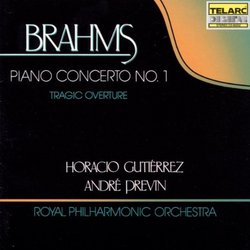| All Artists: Johannes Brahms, Andre Previn, Royal Philharmonic Orchestra, Horacio Gutierrez Title: Brahms: Piano Concerto No. 1 Members Wishing: 0 Total Copies: 0 Label: Telarc Original Release Date: 1/1/1991 Re-Release Date: 7/22/2003 Genre: Classical Styles: Forms & Genres, Concertos, Historical Periods, Modern, 20th, & 21st Century, Instruments, Keyboard, Symphonies Number of Discs: 1 SwapaCD Credits: 1 UPC: 089408025228 |
Search - Johannes Brahms, Andre Previn, Royal Philharmonic Orchestra :: Brahms: Piano Concerto No. 1
 | Johannes Brahms, Andre Previn, Royal Philharmonic Orchestra Brahms: Piano Concerto No. 1 Genre: Classical
|
Larger Image |
CD Details |
CD ReviewsI was surprised Robert L. Berkowitz | Natick, MA United States | 01/02/2003 (5 out of 5 stars) "I do not yet own this recording, but I heard it on the radio. I expected to listen only until the end of the first movement, but I was drawn in and listened until the end.I am not an unqualified fan of Gutierrez's playing. I have regarded him as a "warhorse" pianist without much musical depth. My criticism is silenced by this performance. Gutierrez's playing was beautiful throughout. There was nothing brash or sensationalistic about his playing. Probably the most impressive aspect of this recording is the ensemble between Previn and Gutierrez. Previn pulled a sumptuous sound from the Royal Philharmonic, and highlighted details not typically heard in other performances. He supported Gutierrez beautifully throughout the performance, and there was a sense of camraderie between pianist and conductor that found its way into this recording.I am surprised to say that I would recommend this recording highly, and I won't hesitate to recommend it to anyone." Superb performance. D. R. Schryer | Poquoson, VA United States | 07/15/2002 (5 out of 5 stars) "Although not as well-known as he desrves to be, Horacio Gutierrez is one one the finest pianists of our time. He is particularly skilled in giving genuinely artistic performances of so-called "warhorses" from the Romantic period. This recording of Brahms Piano Concerto No. 1 is an excellent example of Gutierrez in top form. His virtuosity is staggering, but so is his artistry and, thus, this performance is incredibly beautiful. If you are not yet familiar with this graet pianist -- or you just love great piano playing -- please get this recording. It really is superb." Great concerto, great performance Timmy | New York, Ny United States | 12/14/2001 (5 out of 5 stars) "The first time I heard this piano concerto, I felt a little disgusted. It was so fierce and angry, with its constant dissonant trills and tremolos. In addition, the piano part played even less of a soloists role than in the Mozart or Beethoven concertos- it was completely meshed into the fabric of the orchestra. As I continued listening to it, however, and learning to appreciate Brahms uncompromising musical language, I began to see this work as a profound statement of sadness (it was written after the death of his dear friend Robert Schumann).
The first movement of this concerto is very long, and very imposing. A piece filled with countless chilling moments, its emotion is (in my opinion) heightened by its organization into sonata form. I would like to describe two of the most dramatic moments: 1) the retransition from development into recapitulation where piano and orchestra alternate fortissimo syncopated chords, and 2) the piano's entrance, in quiet ominous sixths, and its repetition by the strings near the close of the piece. The movement closes in despair. This is in direct contrast to the second movement, a very spiritual and tranquil adagio. The concluding rondo seems to have been patterned after the rondo from Beethoven's 3rd piano concerto. It has a very long opening theme followed by a lyrical one in the major. A highlight in the middle of the piece is a string fugue based on the opening theme of the work The piece ends in an uplifting manner in the D-major, using motifs from the opening movement. This piece, as well as the Tragic Overture for orchestra, is played in a very bold and powerful manner. Guttierez is a powerful pianist, perfect for the work of Brahms." |

 Track Listings (4) - Disc #1
Track Listings (4) - Disc #1